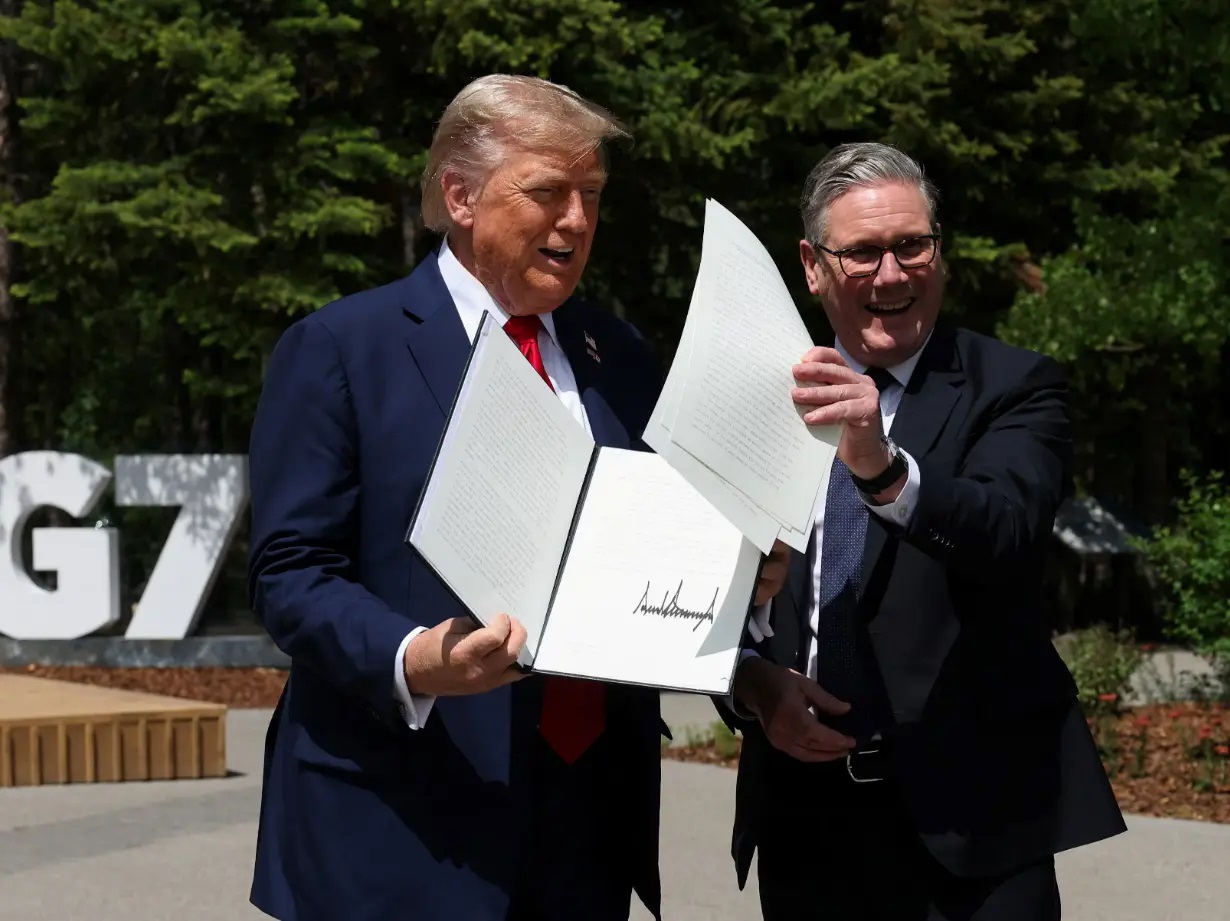President Donald Trump, on Tuesday, June 17, 2025, formally approved a trade agreement that removes certain barriers between the United States and the United Kingdom.
According to online media reports, this marked a significant, though limited, step forward in economic cooperation between the two nations.
This agreement, which implements parts of a pact reached the previous month, includes reductions in tariffs on UK vehicles exported to the U.S.
The British government hopes this move will help mitigate the impact of Trump’s wider tariff regime on UK industries.
However, the deal maintains a 10% tariff on most UK goods, including automobiles, and falls short of eliminating existing tariffs on steel imports.
Speaking at the G7 summit in Canada, UK Prime Minister Sir Keir Starmer welcomed the development, calling it a “very important day” for both nations.
This is the first trade-related announcement from the White House since the U.S. introduced sweeping tariffs on a range of imported goods earlier in the year.
The Trump administration has aimed to push both companies and consumers to prioritize American-made products.
It has launched a series of tariffs that have caused global economic concern, especially in countries like the UK that depend heavily on exports to the U.S.
Steel Industry Still in Limbo
Under the order signed by Trump, the U.S. will now accept up to 100,000 UK-manufactured cars annually at a reduced 10% tariff.
This is a notable cut from the 25% rate imposed earlier this year on all foreign vehicle imports.
However, the administration has not provided specifics on whether similar changes will apply to steel and aluminum imports, stating only that a “similar system” is being considered.
When questioned about the steel tariffs, which currently stand at 25%, Trump said the UK was “very well protected,” citing personal goodwill.
The UK government, meanwhile, confirmed it is continuing to negotiate toward full elimination of tariffs on core steel products.
UK steelmakers remain anxious.
Last year, Tata Steel closed its blast furnaces and is currently in transition to electric furnace production, relying on imported steel in the interim.
Under current U.S. rules, steel must be “melted and poured” in its country of origin to qualify for exemptions.
This clause has raised concerns in the UK steel industry, with Gareth Stace of UK Steel saying the sector urgently needs clarity on the “melted and poured” criteria and quota allocations.
Impact on the Auto Sector
The agreement also includes tariff relief on some aerospace components and a tariff-free quota of 1.4 billion liters of American ethanol exports to the UK.
Previously, these ethanol shipments were subject to a 19% tariff. While this provision benefits U.S. producers, British bioethanol manufacturers have raised alarms.
Paul Kenward, CEO of ABF Sugar, which operates the UK’s largest bioethanol facility, warned that unless government support is provided, the company may be forced to begin redundancy consultations.
ABF has set a deadline of June 25 for securing such assistance, potentially impacting 200 jobs at its Vivergo Fuels plant in Hull.
The UK has also agreed to eliminate a 20% tariff on U.S. beef and increase the import quota to 13,000 tonnes.
Despite this, officials have insisted there will be no compromise on food safety regulations.
Business and Trade Secretary Jonathan Reynolds stated that Parliament would be updated on the implementation of quotas for both beef and ethanol.
According to him, it comes as part of the government’s commitment under the agreement.
Criticism and Limitations
Though the UK government has celebrated the deal, alongside ongoing trade talks with the EU and India, it falls short of being a comprehensive free trade agreement.
The current pact is more modest than the full trade deal long discussed by Downing Street.
President Trump has previously described the agreement as a “major trade deal,” but it is limited in scope and does not constitute a formal free trade agreement, which requires approval from the U.S. Congress.
Criticism has emerged from UK opposition parties.
Conservative leader Kemi Badenoch dismissed it as a “tiny tariff deal,” while Liberal Democrat Treasury spokesperson Daisy Cooper urged transparency.
Cooper called on the government to release impact assessments detailing how the deal could affect UK farmers, food standards, and the steel industry.
Despite these concerns, the agreement is set to take effect seven days after its official publication, offering partial relief for some UK industries while leaving others awaiting further negotiation.







